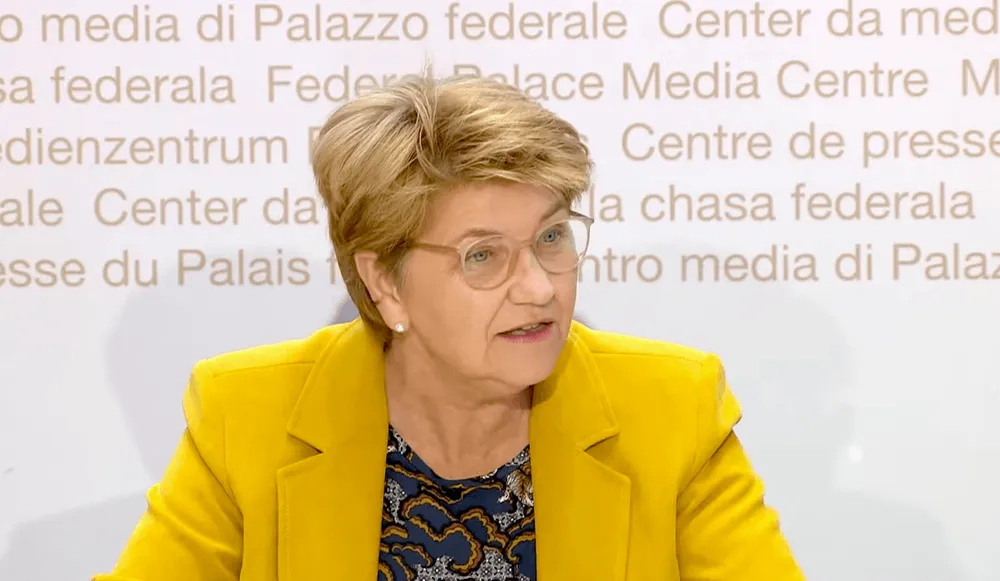Switzerland notes increase in cyberattacks ahead of Ukraine peace summit
Swiss authorities have recorded an increase in cyberattacks and disinformation campaigns ahead of this weekend's summit, where representatives from 90 countries will discuss how to end the war in Ukraine.
Swiss President Viola Amherd said during a press conference on Monday that cyberattacks on the country had increased in recent weeks, but she didn’t provide more details. Foreign Minister Ignazio Cassis said there was a clear “interest” in disrupting the peace talks.
The officials didn’t attribute the incidents to a specific country, but Russia is a likely suspect since it hasn’t been invited and has repeatedly called the summit “meaningless and harmful” because it’s based on the peace proposals of Ukrainian President Volodymyr Zelensky.
Amherd, who is frequently criticized in Russian media, also raised concerns about Moscow’s disinformation efforts, which she called “so extreme that one can see that little of it reflects reality.”
Ukraine's peace summit will be held this weekend at a resort near the Swiss central city of Lucerne. Countries from Europe, North and South America, Africa, the Middle East and Asia have confirmed their participation.
About half of the countries will be represented by heads of state and government, while the other half will send ministers and other state officials, according to Amherd. French President Emmanuel Macron and German Chancellor Olaf Scholz are expected to attend. The U.S. will be represented by Vice President Kamala Harris and national security adviser Jake Sullivan.
Earlier in June, the Swiss National Cyber Security Centre (NCSC) issued a statement advising local organizations to improve their security measures ahead of the event.
“Large-scale events and international conferences are often used as an opportunity to stage a cyberattack,” the NCSC said. “While the motivation and aims of the perpetrators of cyberattacks may differ, the basic protection measures required remain the same.”
The NCSC said it will set up an emergency center to provide technical analyses and a communication platform for national and local government services involved in the Ukraine summit.
In addition, nearly 4,000 military personnel will be deployed to provide security and support air transportation and surveillance for the event, Swiss officials said.
In May, the Swiss media outlet NZZ am Sonntag reported — citing anonymous sources at Switzerland’s Federal Office for Cyber Security — that the country’s cyber officials expect disruptions to the tech infrastructure of “institutions associated with the conference” due to potential hacker attacks, as well as espionage efforts against the participants of the conference.
Swiss Federal Intelligence Services spokeswoman Sonja Margelist previously said that the greatest espionage threat to Switzerland comes from Russia.
Contrary to other European countries and the U.S., Switzerland hasn’t expelled Russian diplomats since Moscow’s invasion of Ukraine.
Margelist said that Russian diplomatic representations are often used for espionage activities. About one-third of Russia’s diplomats in Switzerland are believed to work for the Russian intelligence services, a Swiss intelligence official who wasn’t identified told the local newspaper SonntagsZeitung.
This is not the first time that Switzerland has been subjected to cyberattacks in the context of the war in Ukraine. Last summer, the pro-Russian hacker group NoName057 paralyzed the websites of the Swiss Federal Parliament and the Federal Administration. The hackers linked the attack to Zelensky's attendance at the World Economic Forum in Davos.
Daryna Antoniuk
is a reporter for Recorded Future News based in Ukraine. She writes about cybersecurity startups, cyberattacks in Eastern Europe and the state of the cyberwar between Ukraine and Russia. She previously was a tech reporter for Forbes Ukraine. Her work has also been published at Sifted, The Kyiv Independent and The Kyiv Post.



